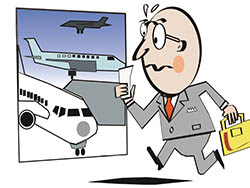 Jetting all over the world with work may sound glamorous but, as any hardened business traveller will tell you, it can be a slog. What’s more, it could also be bad for your health
Jetting all over the world with work may sound glamorous but, as any hardened business traveller will tell you, it can be a slog. What’s more, it could also be bad for your health
To have the life of a business hotshot – travelling around the world, putting in a couple of hours for meetings, before lounging by the pool for the rest of the day – is nice work if you can get it. But you can’t, of course, because this version of business travel doesn’t exist anymore – if the idea was ever actually real.
Any lingering luxuries afforded to work travel disappeared with the financial crisis, as businesses tightened their belts and became more cautious about flashing the cash. Economy flights and tight turnarounds have been the norm ever since.
“The guys here take the mickey out of me when I’m going to Dubai, asking if I’m going to the swim-up bar,” says Trevor Norman, Director of Funds and Islamic Finance at VG in Jersey. “But it’s not all fun – business trips are work.”
Seven million business trips are taken every year by UK residents, according to the Office of National Statistics, a number that’s typically risen by 2.8 per cent per year since 1980. And a survey by Bristol Airport found that those who travel with their jobs typically leave the country eight times a year.
However, frequent business travel can have serious negative effects on health, both mental and physical. This is because there’s a lot going on when you’re travelling for work. You’ve got the stress of getting to the airport on time and passing through security, and the plane could be late.
Trying to sleep in an economy seat is never fun, or you land late at night and find there’s only junk food available. You have some alcohol and you skip the gym before crashing into bed for some restless sleep while fighting your body clock. And then tomorrow is a day of back-to-back meetings.
There’s a proven link between the number of days spent on the road and the risk of long-term health issues such as heart attacks and strokes.
However, a study published last December in the Journal of Occupational and Environmental Medicine also suggests it may be causing more immediate problems. People who travel a lot for work are more likely to suffer mental health problems as a result of lack of sleep, being sedentary and drinking more alcohol. The study also found that anxiety and depression spiked for those who found themselves frequently on the road.
Corporate concerns
While most of us probably travel less than 14 times per month – the frequency identified by the study as being particularly harmful – the negative effects can be felt at more moderate levels too. A World Bank study found that the business travellers among its staff were three times as likely to file psychological insurance claims.
Health risk appraisals at large corporations routinely associate international business travel not just with poor health, but also with problems keeping up with the pace of work. This means it’s not just an individual’s problem, but a corporate concern.
Writing in the Harvard Business Review, Dr Andrew Rundle, lead study author and Associate Professor of Epidemiology at Columbia University in New York, commented: ‘The opportunity to travel is often touted by companies as a benefit in their recruitment of talent, but the accumulating evidence linking extensive business travel to chronic disease risks needs to be factored in to the cost-benefit analysis of the practice.
‘Employees simply need to be aware that business travel can predispose them to making poorer health decisions.’
Dr Bob Gallagher, who oversees occupational health at Queen’s Road Medical Practice in Guernsey, says companies are getting better at taking responsibility for their employees’ wellbeing while on the road. He believes the issue should be considered as part of a company’s risk assessment policy.
“Work travel can cause problems that can make people unwell, or it can make pre-existing mental or physical health conditions worse – or both, as these things are often linked,” he says.
At his practice, Gallagher meets people who travel “an awful lot”, sometimes for weeks at a time. “It’s rare to meet someone who travels frequently for work and who says it’s something they enjoy doing,” he says.
For most people, business travel is something they have to do, and it can be a source of stress. Common ill effects include heartburn, acid indigestion, digestion problems and trouble sleeping, says Gallagher.
“If you’re below par because you haven’t slept, you’re a bit hungover, you’ve eaten too much food, you haven’t exercised… are you performing at your best? Probably not.”
While some of this is down to the individual, companies are starting to realise that it’s their responsibility too, he adds. “Organisations need to look at this. They shouldn’t cram the day full of meetings, so that people can’t have some rest. Make sure people have a bit more time,” says Gallagher.
Ensuring employees don’t return from a mad-dash business trip too tired to drive home from the airport is also a matter for companies’ duty of care. As Andrew Perolls, Executive Director of travel management company Business Travel Direct, says: “Companies have to be more careful how they look after staff.”
This means businesses must ensure that staff aren’t staying in hotels located in unsafe parts of town. They must also consider issues such as access to medical facilities, and ensure they know exactly where everyone is in case of a natural or political disaster.
While Perolls can testify to the fact that the life of the work traveller has gathered speed – a one-day business trip to the US is not unheard of – he believes the situation might be improving. “What people are prepared to put up with is changing,” he says. Staff, for instance, are increasingly bristling at being told to fly budget airlines at the crack of dawn.
The millennial generation, who are now in their 30s, are especially more attuned to work-life balance. “We know that in specialist professions, a job candidate may even look at the travel policy before deciding to join a company if the job involves a lot of travel,” says Perolls.
All in the planning
Letting employees choose where to stay (within a budget) is one way to keep people happy. That way they can pick a hotel with a gym or within walking distance of good dining options.
Allowing people to fly out the night before an event will also prevent stress, as will ensuring there’s downtime between meetings. And giving people a leisure day or two at the end of their trip can turn it into a more positive experience. “It’s a shame to go all the way to Bangkok only to see the airport,” says Perolls.
Trying to manage as many aspects of a business trip as possible makes perfect sense – but ultimately, travel is an exercise in unpredictability. “Stress can be defined as a perceived lack of control, which is common when travelling,” says David Brudö, co-founder and CEO of Remente, a mental health app that aims to promote wellbeing through planning.
Brudö explains how he recently used Remente to plan a trip to Japan, from booking flights and choosing restaurants to scheduling in meditation sessions on the plane. “When you’re travelling, you’re a bit disconnected from the outside world, but this means you actually have some time to take care of yourself. A plane is a great place to just sit and meditate, read a book and invest in yourself,” he says.
It’s hard to avoid business travel. While video conferencing is getting better every year, it’s no a substitute for a handshake. But a stressed or unwell organisation isn’t a smart organisation, and it’s clear that companies are realising that taking care of people is ultimately a sound business decision.
A study by Deloitte found that 88 per cent of UK businesses are working towards improving work-life balance for staff. That means helping people stay healthy on the road by booking the hotel with the nice gym or providing down time. It also means picking people who enjoy travelling to go on trips, while letting those who’d rather not stay home.
Case study: the lifetime flier
 Trevor Norman (pictured), Director of Funds and Islamic Finance at VG, took 90 flights last year, having gone on 18 business trips from his home in Jersey. “I’m constantly travelling,” he says. “My father was BA staff, so my mother flew with me even while pregnant. I’ve flown all my life, literally!
Trevor Norman (pictured), Director of Funds and Islamic Finance at VG, took 90 flights last year, having gone on 18 business trips from his home in Jersey. “I’m constantly travelling,” he says. “My father was BA staff, so my mother flew with me even while pregnant. I’ve flown all my life, literally!
“I was lucky enough to fly to all sorts of places before people were really travelling. That’s carried on in my business career.”
Norman’s BA record shows he’s flown almost 600,000 miles, and he’s got the routine down pat. “In our spare room, I have travel drawers with all the bits I need,” he says. “I have a bag of electrical leads that I just drop in my case. It’s almost instinctive now.”
As he usually flies to the UK first, Norman likes to get that leg of the journey done the day before a meeting – to avoid the risk of sitting in traffic on the M25 as his plane boards.
“Also, I always allow time between meetings, for something to eat and a comfort break,” says Norman. “I try and relax as much as I can on the plane, have a snooze and try and arrive fresh. I can sleep just about anywhere and don’t tend to suffer much with jetlag – I’m lucky that way.”
Missing home was more of a problem when the children were young. “That was stressful for my wife,” says Norman. But now that the kids have left home, his wife often joins him on business trips, making it more enjoyable for both of them.
“I enjoy travel, seeing different places and learning about different cultures. I try and see the positive side of it,” he adds.